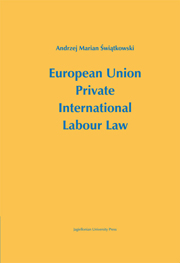Book contents
- Frontmatter
- Contents
- Introductory Comments
- Part I Preliminary Part
- Part II Conflicts of law of individual labour law in the light of the Rome Convention of June 19, 1980 and Regulation of the European Parliament and the Council of the European Communities No. 593/2008 of June 17, 2008 on the law applicable to contractual obligations (“Rome I”)
- Part III Conflict of law issues in individual labour law in light of the Regulation (EC) No. 864/2007 of the European Parliament and the Council of the EU (July 11, 2007), concerning law applicable to Non-Contractual Obligations (“Rome II”)
- Part IV Conflicts of law in collective labour law
- Part V Conflicts of law in social security – the coordination of national social security systems of EU Member States according to the regulation of the European Parliament and Council Regulation (EC) No. 883/2004 of April 29, 2004 on the coordination of social security systems
- Part VI International procedural labour law of the European Union
- Chapter 1 The subject of international procedural labour law
- Chapter 2 Jurisdiction, recognition and enforcement of judgements in matters of employment law
- Chapter 3 Judical co-operation of Member States in matters of employment law
- Selected bibliography
Chapter 1 - The subject of international procedural labour law
from Part VI - International procedural labour law of the European Union
Published online by Cambridge University Press: 05 September 2014
- Frontmatter
- Contents
- Introductory Comments
- Part I Preliminary Part
- Part II Conflicts of law of individual labour law in the light of the Rome Convention of June 19, 1980 and Regulation of the European Parliament and the Council of the European Communities No. 593/2008 of June 17, 2008 on the law applicable to contractual obligations (“Rome I”)
- Part III Conflict of law issues in individual labour law in light of the Regulation (EC) No. 864/2007 of the European Parliament and the Council of the EU (July 11, 2007), concerning law applicable to Non-Contractual Obligations (“Rome II”)
- Part IV Conflicts of law in collective labour law
- Part V Conflicts of law in social security – the coordination of national social security systems of EU Member States according to the regulation of the European Parliament and Council Regulation (EC) No. 883/2004 of April 29, 2004 on the coordination of social security systems
- Part VI International procedural labour law of the European Union
- Chapter 1 The subject of international procedural labour law
- Chapter 2 Jurisdiction, recognition and enforcement of judgements in matters of employment law
- Chapter 3 Judical co-operation of Member States in matters of employment law
- Selected bibliography
Summary
Introduction
The subject of private international labour law consists of the procedural laws governing the scope of the labour courts in disputes against the background of industrial relations with a foreign element. The procedural norms of international labour law determine the jurisdiction of the labour courts and the recognition by courts and enforcement authorities of judgements in matters of employment law issued by foreign labour courts. Procedural norms of international labour law also set out the rules for enforcement of foreign labour courts and other competent authorities to resolve disputes of claims stemming from an employment relationship with an international element. International procedural labour law does not include standards for ruling in conflicts between the relevant provisions of procedural law, although usually in conflict with the provisions remain in force in the Member State in which courts are established and the rules of the country or countries in which the parties are resident or established in reside parties of a dispute involving an employment relationship with an international element. In principle, labour courts ruling in cases involving such claims make decisions according to the procedural laws applicable in the Member State in which the jurisdictional court meriti is located. The competent courts, therefore, rule on the basis of lex fori. It should be noted, however, that appropriate with national rules, procedural rules often contain special rules that apply to employment relationships involving a foreign element.
- Type
- Chapter
- Information
- European Union Private International Labour Law , pp. 251 - 269Publisher: Jagiellonian University PressPrint publication year: 2012



